The atmosphere and weather conditions that greeted music fans at this year's Formoz Festival (
And hot it was, both on and off stage, but the humidity certainly didn't deter the roughly 10,000 festival-goers who turned up on the opening night from enjoying the fantastic line-up of bands at the Yuanshan Children's Recreational Center (
Although the increase of the ticket price to NT$1,500 and the close monitoring of ticket sales had raised some questions regarding the success of the festival, organizers needn't have worried. Actual attendance figures have yet to be calculated, but it's safe to say that Formoz 2005 proved to be both the best organized and most attended in the festival's 11-year history.
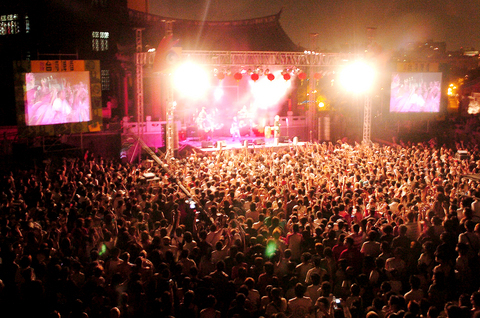
PHOTO: TAI HSIANG, TAIPEI TIMES
With hundreds of people still patiently standing in line at the venue's entrances for tickets and wrist bands at 5:30pm on Friday evening, large crowds had already begun to gather at all of the festivals six stages in order to catch the opening acts.
The focus of attention for large numbers of festival-goers on the opening night, however, were the Wind and Wood stages, where some of the big-name bands were slated to perform.
On the Wind stage Taiwan's FOTC (
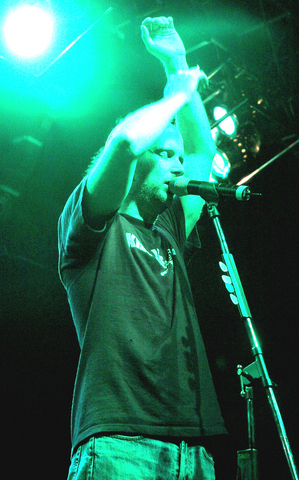
PHOTO: TAI DA-HSIANG, TAIPEI TIMES
Taking to the stage after a lengthy delay due to sound-check problems, Kemuri wasted no time in rousing the crowd. Thanks to the band's energetic lead singer Fumio Ito, the combo had the audience eating out of its hand by the second number. His jokes regarding the audience being "too tired to dance" were not taken lightly by the predominantly late-teens/early-twenties crowd and the band's brass section infused Fishbone-like salvo of ska-punk had incited the first mosh pit of Formoz 2005 long before the sun had set.
Following Kemuri's blistering set, the action and attention moved to the Wood stage, where local expat punk combo, The Deported wowed the crowd with its Dead Kennedy's/Discharge-like barrage of noise.
Their performance might not have been to everyone's liking and the lyrics of the band's politico-punk songs might have been lost on large numbers of the audience, but one overly exuberant member of the audience was so taken by the set that he leapt on stage, removed his pants and began simulating sex with an equally boisterous male friend.
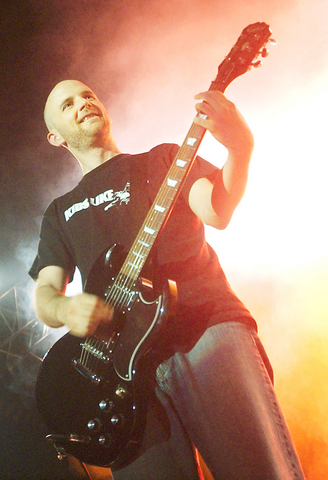
PHOTO: AP
Local psychobilly combo Chicken Rice (
It was Moby, however, that a majority of people had come to see on Friday and he didn't disappoint. Organizers still don't known the exact number of people who came solely to see Moby, but, according to head of Taiwan Rock Alliance (TRA) Freddy Lin (
In a pulsating non-stop 90-minute set Moby performed a wide range of tunes from his latest release Hotel, several older more dance-oriented tunes as well as two fantastic cover versions of AC/DC's You Shook Me All Night Long and Billy Idol's Rebel Yell.
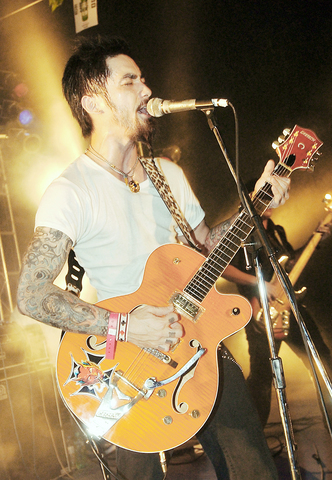
PHOTO: AP
Saturday got off to a slower and less frenzied start, with crowds gradually filtering into the venue from about
4:30pm. The first crowd puller of the second day was local rock combo, Back Quarter (四分衛).
The long-serving yet sadly often overlooked and underestimated four-piece might not have managed to get the crowd as enthused as several of the other acts that performed on the Wind stage over the weekend, but the group pulled off a tight set which included a good selection of material from its upcoming album as well as plenty of favorites from previous releases.
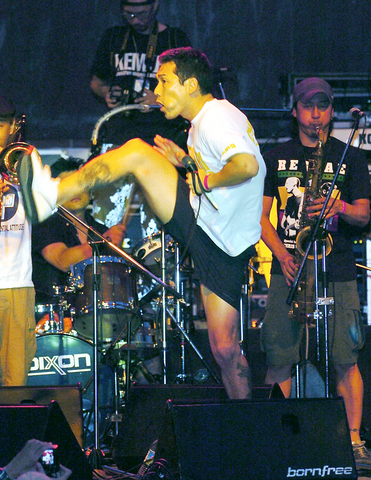
PHOTO: TAI HSIANG, TAIPEI TIMES
The highlight of Saturday night's performances was Japanese pop act Kishidan. Even before the comedic six-piece power-pop combo appeared the atmosphere in front of the Wind stage was charged with emotion. Young teenage girls sporting Kishidan patches and waving their arms wildly in the air rubbed shoulders with twenty-something beer-swilling males in eager anticipation of what was to come.
Always a crowd-pleaser when it performs in Taiwan, Kishidan's performance at Formoz 2005 was memorable. Littered with camp and comedic dance routines and blistering guitar hooks and riffs, the J-rock combo's performance had the audience hooked from the get-go. Even though the band's translator was temporarily missing in action and lost amid the crowds, the between-song, Japanese-language banter still had the audience transfixed, regardless of whether they understood a word of it or not.
As Sunday's performances began the crowds at Formoz hadn't dwindled, but the numerous Taiwan Beer sales girls were having more difficulty in persuading festival-goers to purchase beer than on Friday and Saturday nights. With the three-day festival drawing to a close, as of press time revelers were eagerly anticipating performances by mainstream rocker Lisa Loeb and local anarchists LTK (
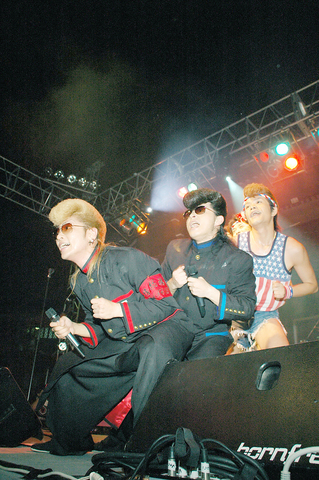
PHOTO: CHEN JUNG-LIANG, TAIPEI TIMES
Although police presence at the festival was greater then in previous years, according to organizers, no arrests were made for either violent or drug-related offenses. From an audience perspective the festival went forward without any problems. The flow of people between the six stages that were located around the park was surprisingly smooth. Ambulance crews were on standby over the weekend, but no injuries were reported at Formoz 2005.
With the events of this weekend still fresh in the minds of the thousands who attended Formoz 2005 and cleaners still removing litter from the venue, organizers have already begun making plans for next year. According to TRA, Formoz 2006 will be bigger and better than this year and boast more stages, more international acts and an even greater variety of music.

In the March 9 edition of the Taipei Times a piece by Ninon Godefroy ran with the headine “The quiet, gentle rhythm of Taiwan.” It started with the line “Taiwan is a small, humble place. There is no Eiffel Tower, no pyramids — no singular attraction that draws the world’s attention.” I laughed out loud at that. This was out of no disrespect for the author or the piece, which made some interesting analogies and good points about how both Din Tai Fung’s and Taiwan Semiconductor Manufacturing Co’s (TSMC, 台積電) meticulous attention to detail and quality are not quite up to

April 21 to April 27 Hsieh Er’s (謝娥) political fortunes were rising fast after she got out of jail and joined the Chinese Nationalist Party (KMT) in December 1945. Not only did she hold key positions in various committees, she was elected the only woman on the Taipei City Council and headed to Nanjing in 1946 as the sole Taiwanese female representative to the National Constituent Assembly. With the support of first lady Soong May-ling (宋美齡), she started the Taipei Women’s Association and Taiwan Provincial Women’s Association, where she

It is one of the more remarkable facts of Taiwan history that it was never occupied or claimed by any of the numerous kingdoms of southern China — Han or otherwise — that lay just across the water from it. None of their brilliant ministers ever discovered that Taiwan was a “core interest” of the state whose annexation was “inevitable.” As Paul Kua notes in an excellent monograph laying out how the Portuguese gave Taiwan the name “Formosa,” the first Europeans to express an interest in occupying Taiwan were the Spanish. Tonio Andrade in his seminal work, How Taiwan Became Chinese,

Mongolian influencer Anudari Daarya looks effortlessly glamorous and carefree in her social media posts — but the classically trained pianist’s road to acceptance as a transgender artist has been anything but easy. She is one of a growing number of Mongolian LGBTQ youth challenging stereotypes and fighting for acceptance through media representation in the socially conservative country. LGBTQ Mongolians often hide their identities from their employers and colleagues for fear of discrimination, with a survey by the non-profit LGBT Centre Mongolia showing that only 20 percent of people felt comfortable coming out at work. Daarya, 25, said she has faced discrimination since she